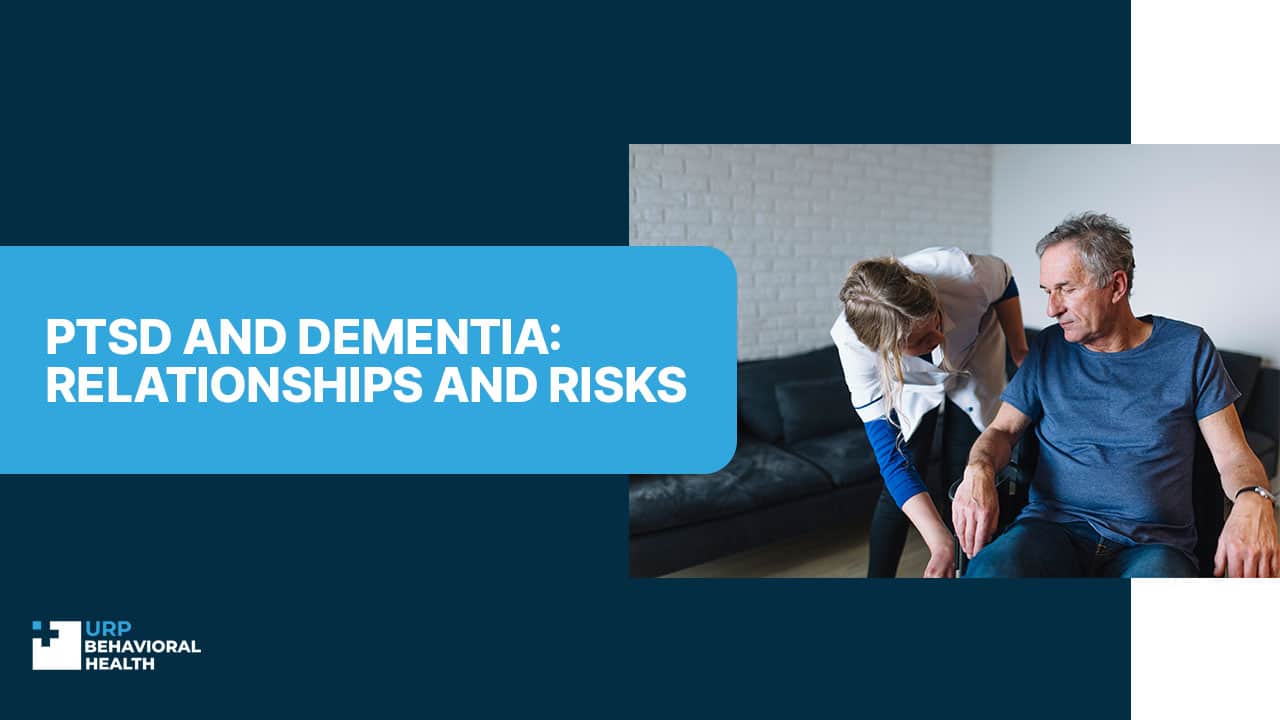
PTSD and Dementia: Relationships and Risks
Improving the mental and physical health of those affected by both PTSD and dementia needs understanding and exploring the link between these diseases.
What is PTSD? PTSD or post-traumatic stress disorder is a disease caused by a strong trauma, such as war, natural disasters, violence, and many more.
Dementia is a disease that not only affects people with PTSD but can also be an independent disorder with such symptoms as a decline in memory or thinking skills.
Those struggling with post-traumatic stress disorder can also often get dementia, but not vice versa. Exploring the connection between these illnesses is vital for creating efficient plans of treatment for patients and reaching better outcomes.
Can PTSD Cause Dementia?
Latest research shows the growing possibility of PTSD increasing the risk of dementia appearing. For now, it is already obvious that people with post-traumatic stress disorder have a higher risk of developing dementia compared to those without PTSD.
Why is this happening? As PTSD is a disease that often includes such symptoms as chronic stress and anxiety, it also leads to physiological changes in people’s brains, which worsens cognitive abilities over time.
Our team will verify your insurance and design a plan tailored to your needs.
Exploring this connection is vital, as it helps to intervene faster and prevent the appearance of worse symptoms by making a plan of healing these disorders in the early stages and even reducing the risk of dementia itself [1].
There is still not enough information about the exact mechanisms connecting PTSD to dementia, but we can explore several existing theories. One theory suggests that the main reason is an increased level of cortisol caused by chronic stress, which can damage a person’s brain over time. High levels of cortisol can cause brain atrophy and cognitive decline which people with dementia also experience. Besides, the inflammation and vascular changes caused by PTSD can also increase the risk of developing dementia.
The Link Between PTSD and Dementia
The link between post-traumatic stress disorder and dementia includes different factors: biological, social, and psychological. PTSD causes changes in brain structure and function, especially in areas responsible for memory and cognitive abilities. These changes make the brain more vulnerable to the development of dementia.
What is no less important, PTSD has a strong impact not only on the mental and physical health of people but also on their lifestyle. Chronic stress often leads to smoking, alcohol use, poor diet, and social isolation, which only increases the risk of developing dementia. It’s vital to promote healthy habits for patients with post-traumatic stress disorder in order to reduce the risk of dementia.
PTSD Dementia Symptoms
Symptoms of PTSD and dementia can overlap, making it difficult to define which disease a patient is struggling with. PTSD includes such symptoms as sleep disorders, flashbacks, anger, and anxiety. While dementia’s symptoms are more connected to memory and cognitive problems. Patients with PTSD also often experience similar to dementia symptoms such as memory loss and difficulty concentrating [3].
If you’re not sure and can’t define which disorder exactly you are struggling with, it’s vital to seek professional help. Professional healthcare is necessary for both mentioned disorders and early diagnosis and intervention can prevent the appearance of worse symptoms and conditions for affected individuals.
PTSD and Dementia Treatment
Curing PTSD and dementia needs a diverse and complex approach that includes the individual needs of each patient’s condition. When talking about PTSD treatment, it usually includes such healing strategies as cognitive-behavioral therapy and eye movement desensitization and reprocessing. While for dementia, it’s more efficient to focus on cognitive rehabilitation, and what’s no less important – lifestyle changes and the creation of a supportive environment to reduce symptoms and maintain the quality of life [1]. Combining these treatments is crucial for those struggling with PTSD and dementia.
As it was mentioned before, lifestyle changes and acquiring healthy habits such as regular exercise, healthy food, and sleep can lead to reducing symptoms of both post-traumatic stress disorder and dementia.
We’ll help you understand your options and guide you toward care.
Can PTSD Mimic Dementia?
Post-traumatic stress disorder can sometimes mimic the symptoms of dementia, especially when it comes to older people. This mimicry includes memory problems, difficulty concentrating, and confusion as these symptoms are common for both PTSD and dementia. However, the roots of these disorders are different and it’s vital to seek professional help for diagnosing one or another disease.
Sometimes, people struggling with PTSD may experience cognitive symptoms that improve with PTSD treatment, which means that the symptoms have no connection to dementia. That’s why it’s so important to seek help as early as possible to prevent misdiagnosis and inappropriate treatment in the future. Therapists should also consider the possibility of PTSD when working with older people with signs of dementia in order to provide efficient healing and support for their patients focusing on both mental health and cognitive health.
Treatment Options for PTSD and Dementia Risk
Efficient treatment of PTSD and reducing the risk of developing dementia should include various strategies and a multifaceted approach. There are some classical therapy methods such as CBT standing for cognitive-behavioral therapy and exposure therapy, which are usually recommended for those with PTSD to go deeper to the roots of trauma. These methods help people to change negative thought patterns, reduce a desire to isolate, and develop healthier coping strategies. While there are alternative therapies that can also help patients come back to normal life and daily routine, they include such practices as art therapy, music therapy, and animal-assisted therapy. Previously mentioned practices offer a creative way in order to process emotions and reduce stress. Besides, it’s no less important to maintain a healthy lifestyle and acquire new healthy habits such as regular exercise, healthy food and sleep, and elimination of smoking and alcohol. The best way, for sure, is combining all these treatment methods and also creating a supportive environment consisting of friends, family, and therapists.
Conclusion
Exploring and understanding the link and differences between post-traumatic stress disorder and dementia is crucial for making an efficient plan for healing both disorders. Both diseases impact not only cognitive and mental health but overall lead to worse life quality for those who are affected.
Effective treatment of both PTSD and dementia requires combining a variety of strategies and approaches including psychological and cognitive aspects. This healing should include not only classical therapy, but also alternative therapy, lifestyle changes, and the creation of a supportive atmosphere.
If you, or someone you know suspects that they are experiencing symptoms of post-traumatic stress disorder or dementia, it is vital to seek professional help, as early diagnosis and treatment can prevent the appearance of worse symptoms, help in managing these conditions, and improve your overall well-being. With the right healing and support, people can come back to a calm and happy life and daily routine.
Don’t wait - confidential help is available right now for you or your loved one.
Sources
- [1] “PTSD and Risk of Dementia”. https://pubmed.ncbi.nlm.nih.gov/36932467/
- [2] “The Relationship Between PTSD and Dementia”. https://pubmed.ncbi.nlm.nih.gov/31488352/
- [3] “Understanding PTSD and Dementia”. https://www.sciencedirect.com/science/article/pii/S2773021224000038
















